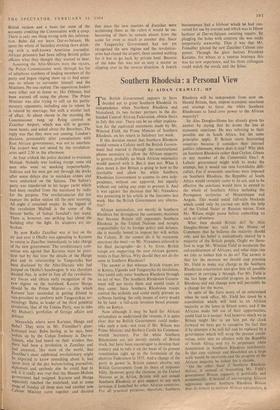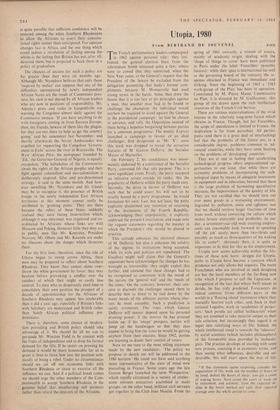Southern Rhodesia : a Personal View
By AIDAN CRAWLEY, MP
HE British Government appears to have I decided not to grant Southern Rhodesia its independence when Northern Rhodesia and Nyasaland, its two former partners in the dis- banded Central African Federation, obtain theirs in July this year. There can be no other explana- tion for the equivocal statements made by Mr. Winston Field, the Prime Minister of Southern Rhodesia, on his return to Salisbury last week. If this decision meant that Southern Rhodesia would remain a Colony until the British Govern-
ment had steered it through the constitutional phases necessary to allow the African majority to govern, probably no black African nationalist would quarrel with it. But it does not. What it does mean is that Britain is going 'to bow to the inevitable and allow the white Southern Rhodesian Government to assume its own inde- pendence, without our approval, but equally without our taking any steps to prevent it. And it was against this decision that Mr. Nyandoro was protesting in his article in the Spectator last week. Has the British Government any alterna- tive?
African nationalists, not merely in Southern Rhodesia but throughout the continent, maintain that because Britain still represents Southern Rhodesia in the United Nations and accepts responsibility for its foreign policy and defence, she is morally bound to impose her will within the Colony. If she cannot do it by economic sanctions she must—so Mr. Nyandoro inferred in his final paragraphs—do it by force. British troops are supporting the new African govern- ments in East Africa. Why should, they not do the same in Southern Rhodesia?
The answer is that whereas British troops are in Kenya, Uganda and Tanganyika by invitation, they could only enter Southern Rhodesia through an act of war. The Southern Rhodesian Govern- ment will not invite them and would resist if they came. Since Southern Rhodesian troops control the airfields and could easily prevent an airborne landing, the only means of entry would be by land--a full-scale invasion based presum- ably on Kenya.
Now although it may be hard for African nationalists to understand the reasons, it is quite clear that no British Government could under- take such a task—not even if Mr. Wilson was Prime Minister and Barbara Castle his Common- wealth Secretary. For the white Southern Rhodesians are not merely mainly of British stock, but have been encouraged to develop their country and to rule it on the basis of its present constitution right up to the formation of the abortive Federation in 1953. And .a change of the party in power in Britain cannot absolve any British Government from its share of responsi- bility. However great the clamour, in the United Nations or in Africa, Britain will not invade Southern Rhodesia or give support to any such invasion if launched by other African countries. For all practical purposes, therefore, Southern Rhodesia will be independent from now on. Should Britain, then, impose economic sanctions and attempt to force the white Southern Rhodesians to hand over power to the African majority?
Sir Alec Douglas-Home has already given his answer by saying that he draws the line at economic sanctions. He was referring to their possible use in South Africa, but the same principles apply. If Britain starts boycotting countries because it considers their internal politics inhumane, where does it stop? Why pick on Southern Rhodesia rather than Ceylon, Ghana or any member of the Communist bloc? A Labour government might wish to make the attempt, but it would run into formidable diffi- culties. For if economic sanctions were imposed on Southern Rhodesia, the Republic of South Africa would certainly come to its aid, and to be effective the sanctions would have to extend to the whole of Southern Africa including the Portuguese territories of Mozambique and Angola. This would entail full-scale blockade which could only be carried out with the help of the United States or Russian navies. Even Mr. Wilson might pause before embarking on such an adventure.
What then should Britain do? Sir Alec Douglas-Home has said in the House of Commons that he believes the 'majority should rule, and his belief is undoubtedly shared by a majority of the British people. Ought we there- fore to urge Mr. Winston Field to accelerate the enfranchisement of Africans, and what steps can we take to induce him to do so? The answer is that for the moment we should stop pressing Mr. Field to make any change in the Southern Rhodesian constitution and give him all ppssible support in carrying it through. For Mr. Field is the last hope of peaceful progress in Southern Rhodesia and any change now will inevitably be a change for the worse.
In spite of the fears many of us entertained when he took office, Mr. Field has stood by a constitution which will lead to an African majority at the latest in fifteen years, and if the Africans make full use of their opportunities, could lead to it sooner. And however much we in Britain might like to see him put the clock forward we have got to recognise the fact that
if he attempts it he will fall and be replaced by a government which will scrap the present consti- tution, enter into an alliance with the Republic of South Africa and try to perpetuate white domination in Southern Rhodesia indefinitely. In that case violence and bloodshed on a large scale would be inevitable and the progress of the African majority be halted for a decade. • On the other hand if Southern Rhodesia thrives, if instead of boycotting Mr. Field's government Britain supports it politically and economically, if instead of encouraging African aggression against Southern Rhodesia Britain does its utmost to restrain African nationalists, it is quite possible that sufficient confidence will be restored among the white Southern Rhodesians to allow the Africans. to assert their constitu- tional rights sooner than anticipated. For opinion changes fast in Africa, and the one thing which could induce a revolution of feeling among the- whites is the feeling that Britain has not, after all, deserted them, but is prepared to back them in a policy of gradualism.
The chances of success for such a policy are far greater than they were six months ago. Although Mr. Nyandoro believes that only thqse 'inspired by malice' can suppose that any of the difficulties encountered by newly independent African States are the result of Communist pres- sure, his view is not shared by all African leaders who are now in positions of responsibility. Mr. Adoula's press and radio in Leopoldville are warning the Congolese almost daily against the Communist menace. 'If you have anything to do with foreigners coming in from Eastern Europe, then, my friends, beware of them like the plague. for they are not there to help us get the country going,' said his announcer last November; and shortly afterwards the Soviet Ambassador was expelled for supporting the Congolese 'Govern- ment in Exile' across the river in Brazzaville. The West African Pilot, the newspaper founded by 'Zik,' the Governor-General of Nigeria, is equally outspoken. 'The hullabaloo of the Communists about the rights of the African peoples and their fight against colonialism and neo-colonialism is deliberately inspired, false and pre-determined strategy.' it said in the same month. And how- ever unwilling Mr. Nyandoro and his friends may be to recognise it, the presence of British troops in the newly independent East African territories at this moment cannot really be attributed to 'growing pains.' They are there because the rulers of these States suddenly realised they were facing insurrection which, although it was mistimed, was organised and co- ordinated by Africans whose links are with Moscow and Peking. However little they may say in public, men like Mr. Kenyatta, President Nyerere, Mr. Obote and Mr. Kaunda are under no illusions about the danger which threatens them.
For the first time, therefore, since the tide of Uhuru began to sweep across Africa, these men may be prepared to reflect about Southern Rhodesia. They know they cannot alone over- throw the white government by force; they may hesitate before provoking a conflict over the conduct of which they might so easily lose control. To men who so desperately need time to consolidate their own position the prospect of a decade of apprenticeship for the Africans of Southern Rhodesia may appear less intolerable than it did a year ago, especially if Britain's links with Salisbury are maintained and British rather than South African political influence pre- dominates.
There is, therefore, some chance of modera- tion prevailing and British policy should take advantage of it. We should do all we can to persuade Mr. Winston Field to be content with the fruits of, independence and to drop his formal demand for the title. If he insists on pressing his demand it would be more honourable for us to grant it than to force him into the position tech- nically of being a rebel. Under no circumstances should we cut off our economic links with Southern Rhodesia or cease to exercise all the influence we can And if a political break comes we should urge the other members of the Com- monwealth to accept Southern Rhodesia in the genuine belief that membership will promote rather than retard the interests of the Africans.



































 Previous page
Previous page